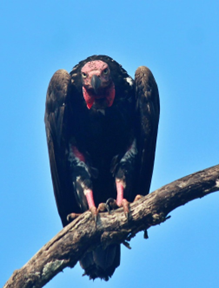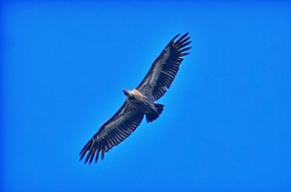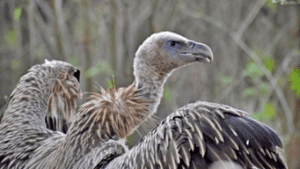TAG: GS 3: ECOLOGY AND ENVIRONMENT
THE CONTEXT: As vulture populations across the country face a worrisome decline, the Wayanad Wildlife Sanctuary (WWS) emerges as a crucial haven for these avian species. Recent findings from the first-ever tri-State synchronised vulture survey underscore the significance of WWS, the sole protected area in Kerala nurturing vulture populations.
EXPLANATION:
- The survey, spanning Kerala, Karnataka, and Tamil Nadu, revealed a total of 320 individual vultures across seven protected areas.
- Notably, WWS accounted for 51 individual vultures, affirming its pivotal role in vulture conservation efforts.
Diverse Vulture Species in WWS:
- Among the 320 vultures observed, the majority were white-rumped vultures (217), followed by long-billed (47), Red-headed (50), Egyptian (4), and Himalayan griffons (2).
- The sighting of Himalayan griffons, exclusively reported in WWS, highlights the sanctuary’s unique contribution to vulture biodiversity.
Vulture Counts and Camp Sightings:
- The survey marked a significant improvement in vulture sightings, with all 12 camps in WWS recording vulture observations.
- In contrast, the previous survey showed vulture sightings in only nine out of the 12 camps.
- The overall vulture count in Wayanad district rose from 46 in the last survey to 51 this time.
Camp-Specific Data:
- Vettathgor Camp:
- Notably, Vettathgor camp in South Wayanad Division, situated outside the sanctuary area, reported sightings of two vulture species – white-rumped and red-headed.
- This diversity reinforces the importance of surrounding regions in supporting vulture populations.
- Red-headed Vultures:
- The sanctuary witnessed an increase in individual red-headed vultures, rising from seven in the previous survey to 16.
- This surge suggests positive conservation efforts within WWS.

- White-rumped Vultures:
- Although the count dropped slightly from 37 to 31, the presence of 31 white-rumped vultures reaffirms the sanctuary’s status as a significant habitat for this species.

- Long-Billed Vultures:
- The survey recorded an increase in long-billed vulture sightings, from one in the last survey to two, signifying positive trends in their population within the sanctuary.

- Himalayan Griffon Sightings:
- The survey documented the sighting of two Himalayan griffon vultures, a notable addition compared to the zero sightings in the previous survey.
- This discovery adds a layer of uniqueness to WWS in terms of vulture biodiversity.

Conservation Implications:
- WWS’s role as a refuge for vultures holds broader implications for biodiversity conservation.
- The sanctuary’s success in fostering diverse vulture species accentuates the need for continued conservation efforts, both within the sanctuary and in the surrounding areas.
Wayanad Wildlife Sanctuary (WWS):
- Located in Kerala, Wayanad Wildlife Sanctuary (WWS) is an integral part of the Nilgiri Biosphere Reserve. It was established in 1973.
- Nilgiri Biosphere Reserve was the first from India to be included in the UNESCO designated World Network of Biosphere Reserves (designated in 2012).
- Other wildlife parks within the Reserve are: Mudumalai Wildlife Sanctuary, Bandipur National Park, Nagarhole National Park, Mukurthi National Park and Silent Valley.
- Spread over 344.44 sq km, Wayanad Wildlife Sanctuary is contiguous to the tiger reserves of Nagerhole and Bandipur of Karnataka and Mudumalai of Tamil Nadu.
- Kabini river (a tributary of Cauvery river) flows through the sanctuary.
- The forest types include South Indian Moist Deciduous forests, West coast semi-evergreen forests and plantations of teak, eucalyptus and Grewelia.
- Elephant, Gaur, Tiger, Panther,Sambar, Spotted deer, Barking deer, Wild boar, Sloth bear, Nilgiri langur, Bonnet macaque, Common langur, Wild dog, common otter, Malabar giant squirrel etc are the major mammals.
Conclusion:
- The findings from the tri-State vulture survey underscore the critical role played by Wayanad Wildlife Sanctuary in preserving and nurturing vulture populations.
- As vultures face numerous threats globally, the sanctuary’s success becomes a beacon of hope, emphasizing the importance of sustained conservation measures and regional collaboration in safeguarding avian biodiversity.




